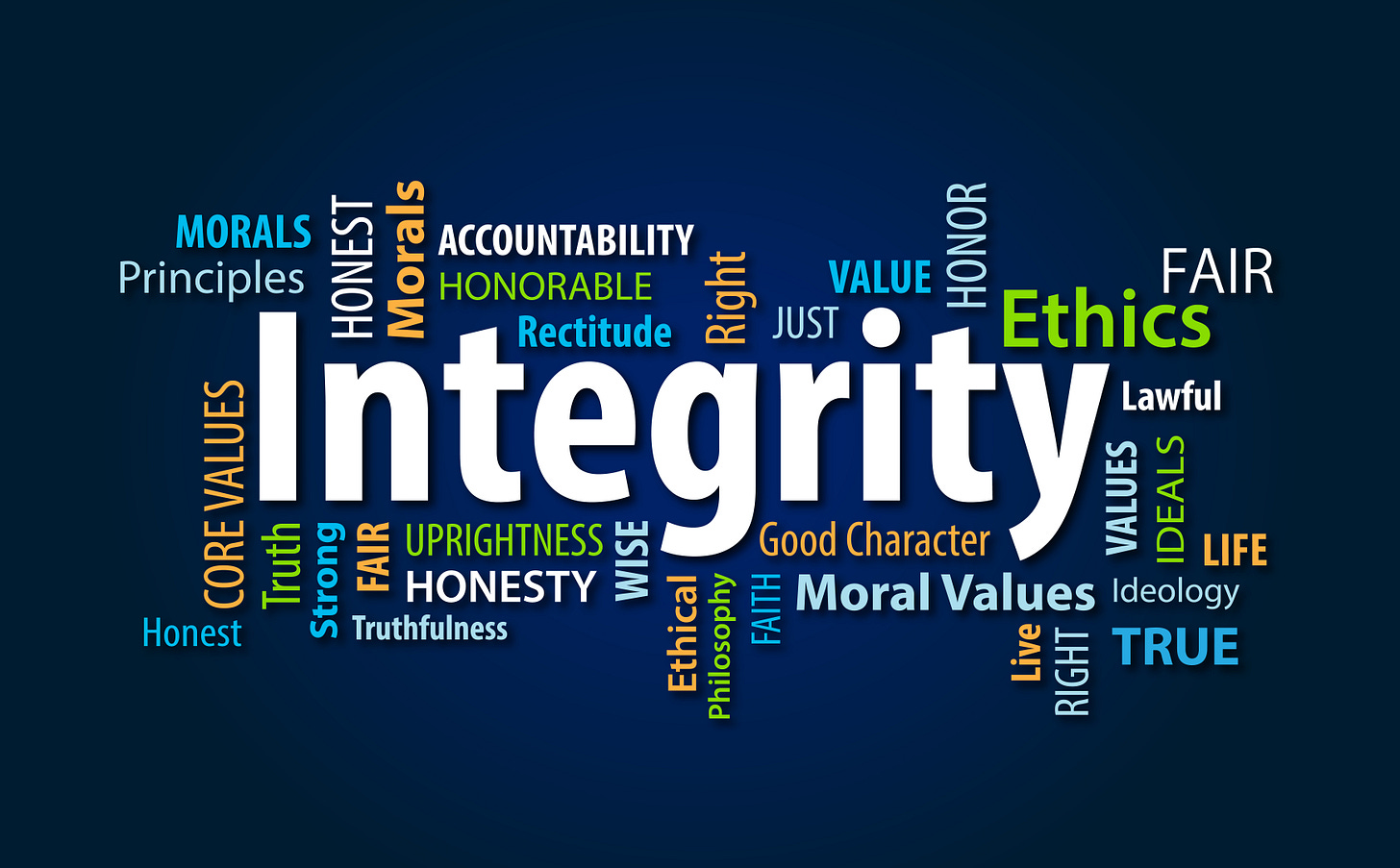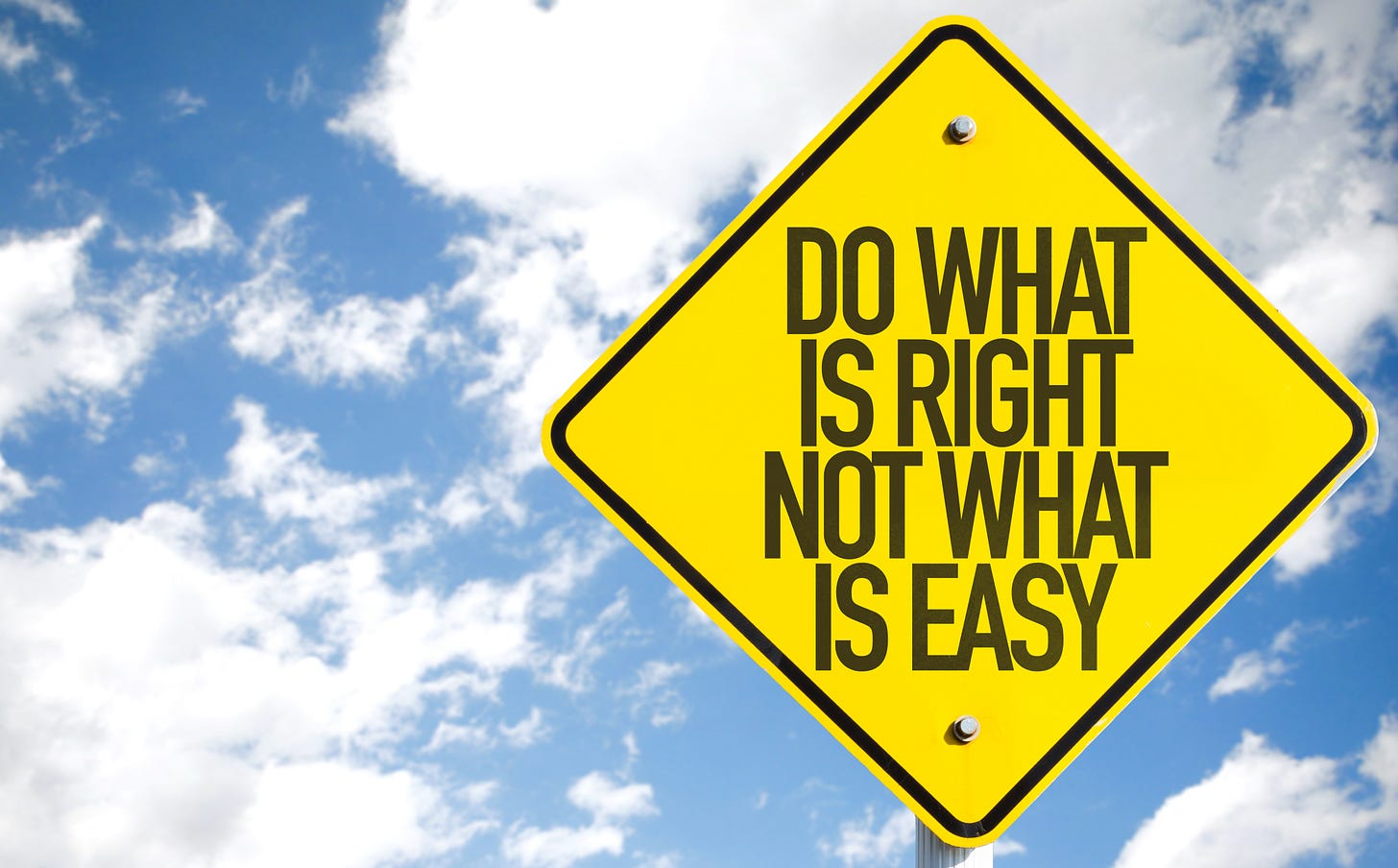How to Demonstrate Integrity
Build a Strong Reputation for Honesty and Truthfulness
Welcome to the third issue of ValuesCrafting. Our focus today is on the value of integrity. You may be surprised when you look at the second article, which discusses lapses in integrity and why they matter. Seemingly simple everyday actions you may never have considered demonstrate integrity—or not.
We provide a list of curated resources to explore integrity in action further.
With ValuesCrafting, we aim to provide a resource organizations and individuals can use to understand and demonstrate values in action. If you oversee the work of others or provide coaching and counseling, you'll find practical applications of values that you can share and implement.
This summer is our soft launch period as we expand the content on our Substack and enhance its value for you. In September, we will begin sharing this resource with interested groups and spreading the word further.
In the meantime, thank you for reading ValuesCrafting. We appreciate your help sharing this post to reach a larger audience committed to living according to their core values. Thank you kindly. SusanDemonstrate Integrity Through Your Actions
Want to build a reputation for integrity? It's all about aligning your actions with your values, no matter where you are or what you are doing. Understanding how to display integrity in your everyday actions at home and work is critical.
Integrity is the quality of having strong ethical principles that are consistently followed, even when no one is watching. Central to integrity are honesty, trustworthiness, and consistency in actions and words.
Integrity means being self-aware, accountable, responsible, truthful, and demonstrating internally consistent actions. People who have integrity display these characteristics.
Act from a strong moral compass: Integrity starts with clear ethical principles guiding your decisions. What truly matters to you? Honesty? Fairness? Reliability? Define your core values and let them be your guiding principles.
Walk the walk: Integrity is about aligning your beliefs with your behavior in good times and bad. Honesty and commitment are cornerstones of integrity. This means being truthful even when faced with difficult situations at work. It also means keeping your promises, no matter the inconvenience. Similarly, integrity shines through your actions at home when you follow through on your commitments to family and friends.
Consistency is key: People trust those who are predictable in their behavior. They value their feeling of safety when they know exactly what to expect. Don't be the person who says one thing and does another. Upholding your values consistently builds trust and respect from family, friends, and coworkers. In contrast, failing to follow through on commitments can damage how others perceive your reliability and erode faith and trust.
By following these principles, you can build integrity in all aspects of your life and become known for your honesty, reliability, and strong moral character.
Examples of Integrity in Action
People who demonstrate integrity draw others to them because they are trustworthy and dependable. They are principled employees, and you can count on them to behave honorably.
Investor extraordinaire Warren Buffet once said, “You’re looking for three things, generally, in a person: intelligence, energy, and integrity. And if they don’t have the last one, don’t even bother with the first two.”
Here are examples of integrity in action so you can recognize this vital character trait in employees and coworkers. People can reflect different facets of integrity in the workplace.
Honesty
A software developer attempts to optimize a specific process but encounters problems because of his code. He could push forward with his suboptimal code to save his work and his face with coworkers.
But instead, he demonstrated integrity and chose to go to his team. He described the dead ends he had run into and explained that he thought pushing forward could create future problems for the product. His dead ends might prevent the development of advanced features for the software.
The team discussed the problem and worked through a solution. John scrapped all his code and started from scratch with the team’s input. Thanks to his honesty, his new solution allowed the team to expand the product’s capabilities quickly in the future.
Accountability
An employee produced a report once a week that was used on Friday by two other departments to plan their workflow for the next week. Knowing she planned to take a vacation soon, she ensured the report would be produced as needed in her absence.
The employee taught another person how to create the report. Additionally, she wrote out the appropriate procedures so that the coworker had a guide in her absence. Marsha supervised the trainee for two weeks so that her replacement had a chance to do the actual task.
Finally, she touched base with the other two departments to let them know that a new person would create their report while she was gone in case the coworker needed help.
Responsibility
A team missed a deadline for an essential deliverable from their team. The leader took personal responsibility for the missed deadline rather than throwing the team members under the bus. They then addressed the problems as a team and implemented safeguards to keep them from underperforming again.
Team members recognized their contribution to the failure, but because their leader took responsibility as a team leader, the team learned from their mistakes.
Dependability
A parent was responsible for picking the children up from school after work three days a week. Rather than expecting teammates to accommodate the schedule automatically, the employee took responsibility for informing each teammate about this commitment.
The employee went out of the way to make scheduling meetings and deadlines easy for the team. The employee communicated effectively with the team members and avoided hard feelings and distrust by their openness and honesty.
Why Integrity Is Critical at Home and in the Workplace
People can demonstrate their integrity—or lack thereof—daily through actions with each other, their families, and customers or clients. If you haven't hired the right people, a lack of integrity will be evident in their behavior.
A workforce comprised of people with integrity is one where you can trust people to perform to the best of their ability. They don't compromise on their ideals, cut corners, cheat, or lie. They behave according to an internally consistent code of values and a solid, agreed-upon moral compass.
Integrity can strengthen relationships with vendors and customers because they can trust you'll keep your promises and act honorably if something goes wrong.
Plan to discuss integrity's meaning in your workplace and home regularly. Looking at dilemmas faced by individuals dedicated to acting with integrity gives your employees a chance to learn your expectations. It also helps develop a culture of integrity in the workplace.
Lapses in Integrity—Why They Matter
Integrity is a crucial life value, but what does acting with integrity mean? While many people believe everyone knows right from wrong, the reality is more complex. People often disagree on what constitutes right and wrong. That's why integrity and business ethics are constantly debated, from news headlines to casual office conversations.
Common sense, often considered a driver of integrity, is not as universal as you might hope. What seems evident to you might be a gray area for someone else. Reaching an ethical consensus can be a challenge.
As a result, acting with integrity in business doesn't come naturally to everyone. Building a solid foundation of integrity often requires actively teaching and reinforcing ethical practices in everyday work. People need real-life examples of integrity in action.
And, as our world becomes increasingly complex, finding the correct answer that satisfies most stakeholders—employees, customers, potential employees, shareholders, and board members—often requires a balanced approach.
When you operate globally, people in other countries may have different ideas about what is essential for integrity and ethical practices. Countries have varying ethical and social norms, making navigating these complexities with integrity even more crucial.
Integrity Challenges at Work
People walk a tightrope when it comes to ethical choices in the workplace. While running a quick personal errand during a break might seem harmless, what about using company resources for an individual project or filing fudged expense reports? The line between harmless and harmful can be blurry.
Do people consider whether their choices are ethical? An individual might think, I work hard, so spending an hour on personal business online is okay. Or, I'm underpaid, so it's OK if I fill in my time card to get a bit of overtime pay. They may not consider these choices wrong, as they can justify why they do what they do.
Think about these scenarios that happen in organizations every day. These scenarios demonstrate a range of integrity levels, from minor ethical breaches to serious misconduct, each of which can impact the trust and functionality within an organization.
Consider these ten challenges to integrity.
An employee surfs the web to shop for personal items during company time.
A plant manager decides to ship a product to a customer even though they know the parts have a quality problem because the problem doesn't affect the part function, and the customer probably won't notice.
A manager shares personal information an employee confided with other employees. They rationalize that the other employees will be more sympathetic to the employee’s problems.
An individual spends several hours a week on their iPhone talking with their children, associated caregivers, schools, and friends.
A salesman marks parts as sold in the company database, thus depriving others of the ability to sell the parts, even though their sale is uncertain.
A manager shares essential company information with a competitor for potential gain.
A store manager misrepresents the quality or functionality of an advertised sale item.
An employee uses the last of a toilet paper roll in a bathroom cubicle and leaves without replacing it for the next person.
An employee takes office supplies home to stock their home office.
A finance officer accounts questionably for purchases and expenditures.
Every business encounters these situations and similar ones. You need to make sure your business standards are clear.
Integrity Challenges in Life
Breaches of integrity can also occur in your personal life, affecting relationships, trust, and your personal growth. Here are ten examples of how integrity can be compromised outside of a professional setting. You may not have considered them in terms of demonstrating integrity, but integrity is inherent in each one.
You get home from the grocery and discover you haven’t been charged for a steak. You decide to keep it because the store won’t notice anyway.
You engage in a secret, online relationship with someone, not your spouse or partner.
You promised to help a friend by watering their houseplants while they were on vacation. You skip a watering by rationalizing that the plants will be fine if you miss just once.
You realize the cashier has given you an incorrect amount of change in your favor when you purchase an item, and you decide no one will ever know and keep it.
You wake up late for work and call in, telling your manager that your baby is sick and you need the rest of the morning off to deal with the situation.
A friend shares confidential information with you, and you break their trust by gossiping about it with others.
You work in a hybrid workplace, where the expectation is that you will work 40 hours from anywhere. You find other things to do several days a week, thus shortening the time you spend on work for your employer.
A part of your lunch spills on a lunchroom table. Rather than wiping it up so the next person has a clean lunch space, you decide the janitor will get it in their nightly cleaning.
You tell a friend you can’t come over for dinner because you have plans for the evening when you just don’t want to go.
You commit to completing a project but find twenty reasons to justify not following through.
So, before you relegate the subject of integrity to the touchy-feely, head-in-the-clouds worlds of philosophy, religion, or academia, consider the potential positive impact on your organization of addressing integrity as a personal and business essential.
Conclusion About Integrity
While often viewed as a lofty ideal, integrity is deeply practical and essential in both professional and personal realms. It influences trust, reputation, relationships, and overall functionality in your life and organization.
By acknowledging the complexities of ethical behavior and actively promoting a culture of integrity, organizations can navigate challenges more effectively. This will ensure long-term success and a positive work environment.
ValuesCrafting Compass: Curated Resources for Value-Driven People
People with integrity are trustworthy, contributing family or team members. In this article, you’ll find characteristics of a person with integrity, examples of integrity in action at home and work, and how you can make conscious choices to act ethically. Add to your knowledge about integrity at Indeed.com.
Integrity has three distinct characteristics. It starts with a fundamental moral code you likely learned from your parents. The second issue discussed is why a group must share this ethical code. Find out more about the morality-based societal approach to ethical behavior and integrity from William Biagini's writing on FSUNews.com. He asks, “Why is it important for a society to have integrity?”
As much as we favor a home and work life based on ethics, honesty, and doing the right thing, many societal factors affect whether people experience success by living this value. Matt Steinhausen says, “The reason so many people preach the importance of integrity is because it's not popular to speak ill of truth, honesty, and values, and also because society as a whole doesn't want to accept the fact that truth and fairness are no longer important to success.” You’ll find this alternate view both refreshing—and very sad at LinkedIn.com.
Robert Chestnut, the author of Intentional Integrity: How Smart Companies Can Lead an Ethical Revolution and Why That’s Good for All of Us, says, “Integrity can be a superpower that inspires employees and resonates with today’s values-minded consumers.” In The Harvard Business Review, he recommends six practices organizational leaders must incorporate if integrity is to flourish in their workplace. (unlocked link)
This “Integrity and Work Ethics Test” from Psychology Today is based on a traditional workplace and may not reflect the realm of a knowledge worker. It’s worth taking if you are interested in a snapshot of your ethical standing and noting more workplace integrity dilemmas. The full report costs $6.95. Answering the questions took 15 minutes.
Subscribe to ValuesCrafting Today
Subscribe to ValuesCrafting today and start living your best life, aligning your actions with what matters most. The ValuesCrafting newsletter is free as it aims to spread important information to as many people as possible.
You won’t have to worry about missing any of the issues of ValuesCrafting. Every edition of the newsletter goes directly to your inbox every other Wednesday.






